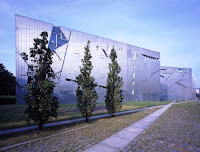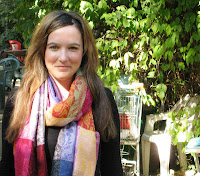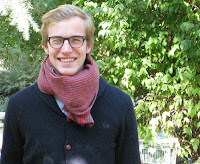We asked this year's SAIS Bologna students to drop any pretense of modesty and tell us what they are most proud of. Here is what we learned:
I authored the first-ever concordance of the Persian text of the Masnavi of Rumi -- 3,000 pages long. I have also written a history book, "Memoirs of the Badshahi Mosque," which is under editorial review at the Oxford University Press.
Finished 4th at the 2008 Dutch Youth Chess Championship and was ranked among the top 100 adults that year.
I am the first person in my family to earn an undergraduate degree and to enroll in a masters program.

I composed the first municipal heraldry data base in Bosnia.
Conceptualized a series of
short videos that emphasized the importance of the internal socio-political reforms in Bosnia-Herzegovina.
Worked with local NGOs in Delhi, India to provide shelter, medical supplies and advice to homeless men and women fighting heroin addiction.
Launched a public health NGO in the Bahamas that has over 120 members and volunteers and which raised nearly $16,000 in donations and through fundraising.
As a team captain, led my badminton team to four consecutive badminton championships at Tsinghua University.
Was part of a small student team that designed and coded a dispatch system for my former college's Public Safety Office.
Started work at the World Bank 10 days after earning my undergraduate degree.

Saw Cat Stevens in concert.
Other than dealing with my Italian landlady with poise, I am proud of crossing cultural divides by being a Jew who lived in Jordan and worked with Palestinian students.
Have visited former or current conflict areas such as Belfast, Sarajevo, Israel, the Palestinian territories and Northern Cyprus.
I participated in a three-month internship with non-profit AVANTI in Quito, Ecuador, working on a public health research project. We surveyed 60 households in one of Ecuador’s poorest villages as a first step in discovering what the biggest public health challenges were.
 |
| In El Gamaleya, Egypt |
I was among 15 American college students selected to participate in the Global Leaders in the 21st Century public diplomacy program sponsored by the U.S. Department of State. As part of the program, we worked alongside 35 Arab students restoring primary schools in the historic El Gamaleya district of Cairo, Egypt.
Have spent time in 35 countries, mainly thanks to scholarships, Department of State Public Diplomacy Programs, humanitarian outreach.
I'm most proud of a moment when I stood in front the Churchwide Assembly of the Evangelical Lutheran Church of America in support of a resolution to ordain practicing homosexuals. I was 19 and the president of the church's youth organization. It was the first time I received hate mail.
I was diagnosed with narcolepsy a week before DC pre-term, which helps to explain the 100% success rate of falling asleep in certain classes in undergrad.
I worked as an Emergency Medical Technician for the past six years during high school and college, becoming an ambulance Crew Chief. While in Bologna as an undergraduate, I served as an emergency responder for the Pubblica Assistenza.
Last year, I served on the Board of Directors for the Mission Learning Center, a childhood literacy non-profit. I managed the MLC's social marketing and fundraising efforts, more than quadrupling the organization's donations from Facebook.
I have served as an undergraduate "ambassador" student to India, China, Ecuador and Russia, and won several language competitions in Russian and French.

I flew over the Himalayas, seeing Mt Everest, K2 and seven other of the highest peaks in the world.
I'm most proud of having the courage to leave a really good job to come back to school at SAIS.
Last year I created a Facebook group to gather friends willing to help the families of the victims of a series of racist murders in my country. In a few weeks time we ended up with 200 members and achieved prime-time news coverage. We are now supporting seven affected families by helping them get proper legal assistance and access to medical attention, and by raising money to help them pay overdue utility bills.
I climbed the Parinacota volcano in Bolivia -- 6300 meters high.
I tried out for the under-19 U.S. Women's National Rugby Team in my senior year of high school. The coach told me if I worked out with the team for the few months and then went to a college with a very strong women's team, I would be their starting fly-half. It was an exciting prospect, but eventually I had to choose between serious athletics or serious academics. I went to a college with a small, relatively uncompetitive team. In two years we went from being last in the matrix to first. I chose academics over athletics in a pivotal point in my life, and five years later, I have accomplished more both academically and athletically because of that choice. There's not a moment I wish I would be playing professional rugby instead of being at SAIS Bologna pursuing an MA.
I left Cambridge University with a starred first and a half Blue.
I've circumnavigated the globe by ship and been to 26 countries. I'm 25 and I'm trying to keep my country count above my age.
The documentary series I worked on is going to attract more than 60 million Chinese viewers on CCTV in prime time in November.
Conquered the highest accessible mountain in Southeast Asia -- Mt. Kinabalu on Borneo (4,095 meters).
The most difficult environment in which I have lived was my high school year abroad in Columbia, South Carolina. During the first three weeks I had serious problems understanding my math professor and not many students were interested in cultural exchange.
I spent 6 years writing and editing at magazines and for public radio. I was on the floor of the Republican National Convention blogging when Sarah Palin gave her "what's the difference between a hockey mom and pit bull" speech.
I am most proud of having taught English in rural Thailand. I learned more about myself and what I wanted to do with my life than I had in the previous 23 years.

A discussion about the Holocaust Memorial in Berlin prompted me to write a paper about it in high school that was awarded the highest award by a state parliament and which allowed me to be part of state delegation to the "Day of German Unity" and to meet the president of Germany.
As a cross-cultural awareness expert in a multinational consulting company, I conducted workshops for large groups in India and across Europe.
I was a mentor during undergrad and helped inner city youth on Saturday mornings with college applications and social justice issues. My mentee ended up receiving a scholarship and many prestigious internships at MassArt for graphic design.
As a senior in college, I led a retreat for freshmen. There was a student in my group who hated school, hadn't made friends, was consistently bored with classes and wanted to drop out or transfer the next year. We spent a lot of time together second semester discussing how he could find his place at school. He's now a senior, loves school and has done incredibly well. He'll graduate this spring cum laude and with a solid group of friends and peers. I'm so proud of his success and courage.
Worked for U.S. Army Intelligence, then for the U.S. Treasury, then in London as a tax lawyer for 31 years.
Held shuras with tribal elders in Afghanistan.
I launched a project to help street children in Thessaloniki Greece. We ended up rebuilding a community center for the Roma children of the Aghia Sophia community.
While an undergraduate I traveled to some 28 countries while involved in programs such as Semester at Sea, the Model U.N. and relief efforts. This summer, as a Pickering fellow, I worked at the U.S. State Department reporting daily to the Secretary of State.
Nelson Graves
































